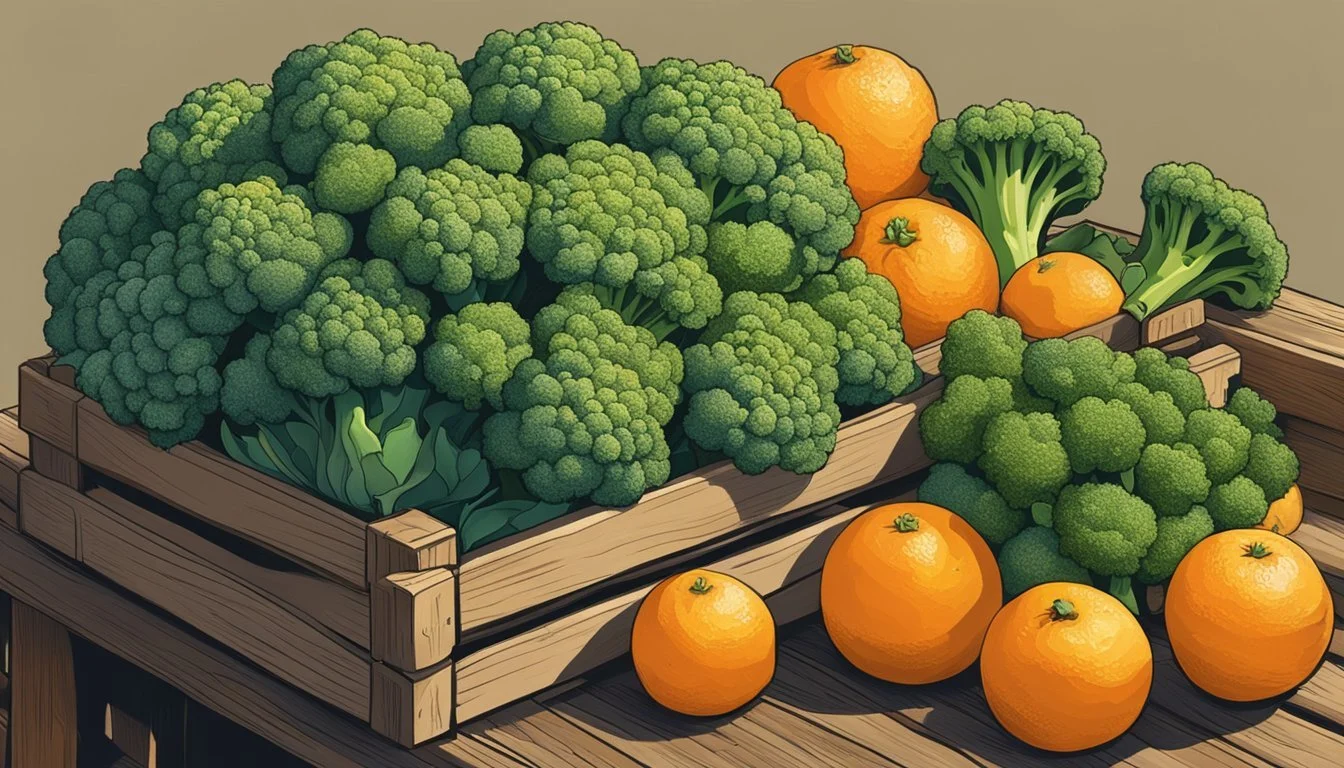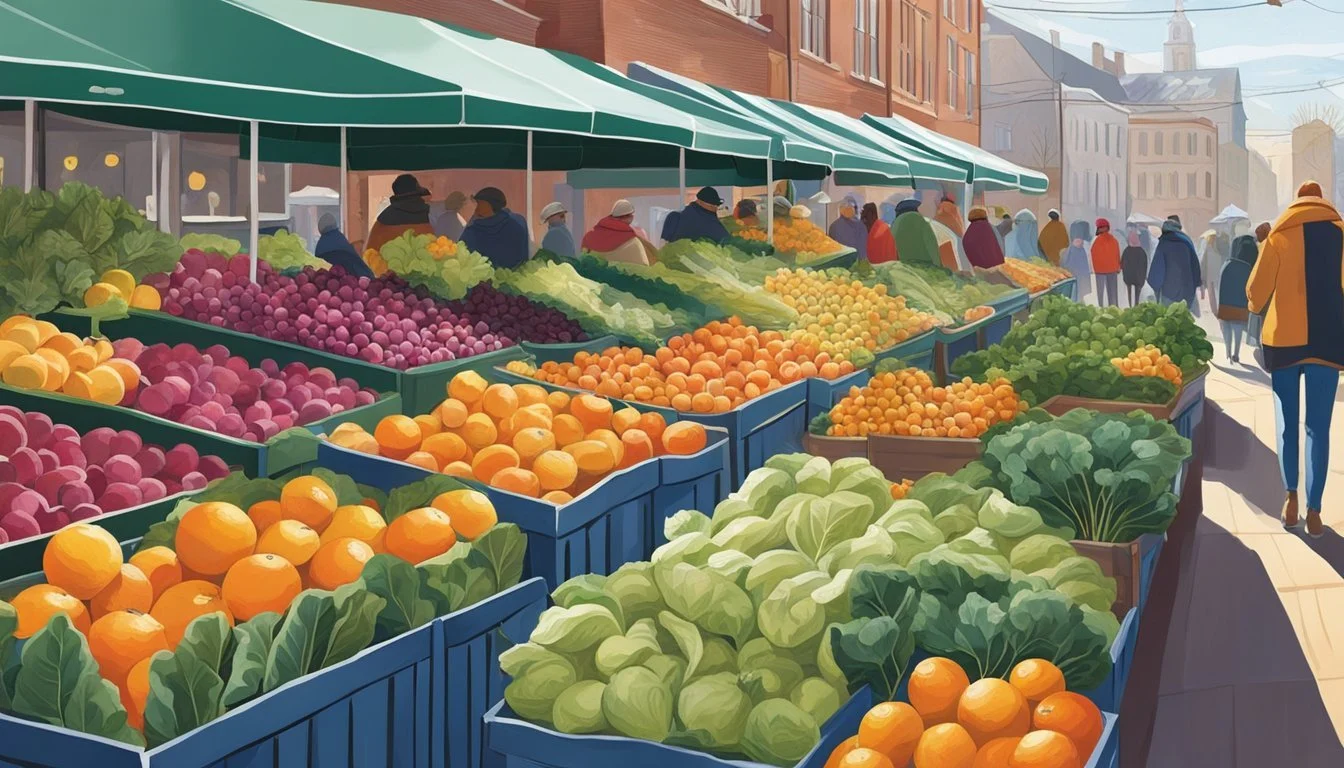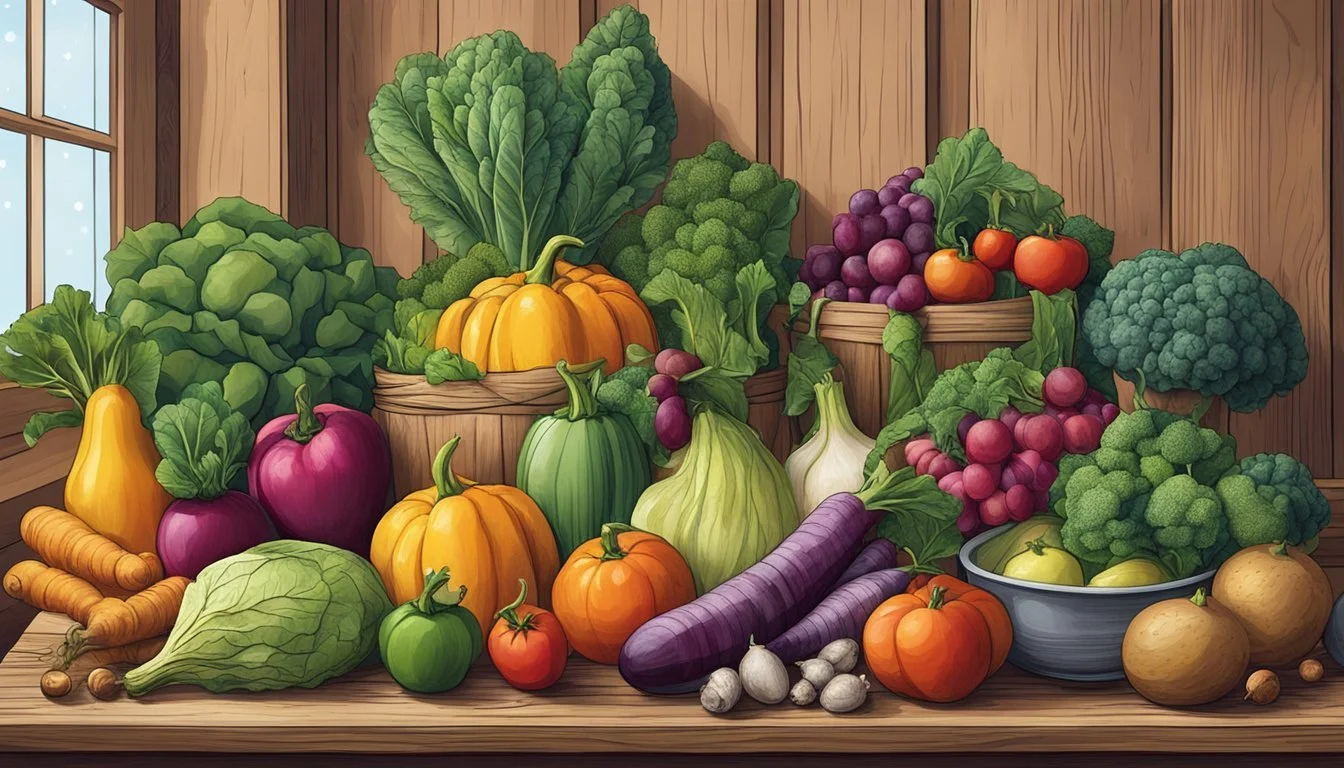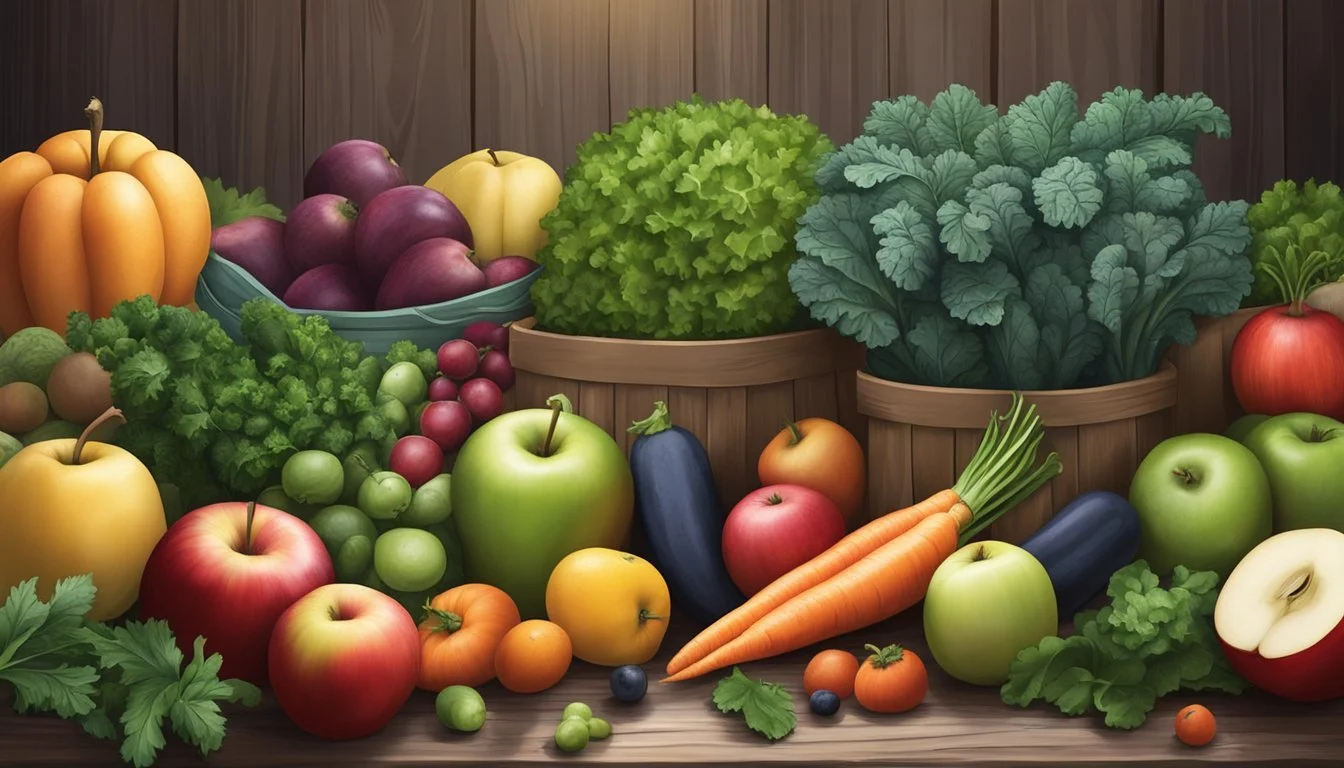Virginia Seasonal Fruit & Vegetables in February
A Guide to Fresh Produce
This Article is Part of our Virginia Seasonal Fruit & Veg Calendar
Virginia's seasonal bounty during February offers a more limited but still varied array of fruits (What wine goes well with fruit?) and vegetables. Sourced from local farms and markets, these seasonal offerings reflect the region’s winter climate and agricultural practices. Apples, which have been harvested in the previous months, are still available in good condition thanks to cold storage methods that extend their freshness into the spring. Despite the chilly weather, Virginia's agriculture finds ways to provide fresh produce to its residents.
In addition to apples, consumers can find a variety of cold-weather vegetables that thrive in February. Root vegetables such as beets are typically hearty and can be stored for use throughout the winter months. Farmers also supply leafy greens like arugula, which retains its peppery flavor, although it is less pungent than during the heat of spring or fall. Hardy winter greens are not only nutritious but also offer culinary versatility, being a staple in winter soups, salads, and side dishes.
Seasonal eating in Virginia at this time of year reflects an appreciation for the state’s winter harvest and a commitment to supporting local agriculture. By choosing fruits and vegetables that are in season, consumers enjoy fresher produce, support the local economy, and reduce their carbon footprint due to shorter transportation distances. Understanding Virginia's February seasonal produce can guide smart, sustainable choices that celebrate local flavors and the rhythm of the seasons.
Overview of Virginia's Seasonal Produce
In February, Virginia's farms showcase seasonal crops adapted to the winter climate. The month's produce offers a mix of hearty vegetables and storage crops that thrive or endure during the cooler temperatures.
Importance of Eating Seasonally
Eating seasonally ensures consumers enjoy fruits and vegetables at their peak flavor and nutritional value. It also supports local farms by aligning with natural growing cycles, which benefits the environment and the local economy.
February's Seasonal Climate and Agriculture
February in Virginia is characterized by cold winter weather, which influences what crops are available. Farms in the state utilize both traditional and innovative methods to cultivate produce that can withstand the chilly temperatures.
Crops typically in season: Sweet potatoes
Harvesting methods: Storage of fall-harvested produce and greenhouse growth
Virginia's Regional Crop Availability
Crop availability in February varies by region, with some areas offering limited fresh produce. Availability is primarily determined by storage capability and greenhouse operations.
Stored crops: Apples, sweet potatoes
Greenhouse-grown produce: Various herbs
Farmers' markets and local farm stands may have additional winter produce such as hearty greens, depending on the specific practices and microclimates of the region.
Seasonal Fruits in Virginia
In February, Virginians can enjoy a selection of both stored and greenhouse-grown fruits. While the selection is not as varied as in the summer months, there are still fresh options available.
Citrus and Pome Fruits
Apples: Even though the apple harvest season has ended, many varieties like Fuji, Gala, and Granny Smith are stored effectively to last through the winter. These apples maintain their texture and flavor, making them a reliable choice for fresh consumption or culinary uses.
Pears: Similar to apples, several pear varieties are kept in controlled atmospheres post-harvest to ensure their availability. Pears during this time are best consumed when they've ripened to a sweet and soft texture.
Exotic and Greenhouse-Grown Varieties
Citrus: While Virginia is not known for its local citrus production, fruits such as lemons, oranges, and grapefruits can be found in grocery stores. These are typically sourced from warmer climates where they are in season.
Kiwi: Some kiwi fruits are available during this time as they are imported. Their sweet and tangy flavor can add a pleasant diversity to the winter fruit palette.
Pomegranate: While pomegranates are typically in season in the fall, some specialty stores might carry them into the winter months, often sourced from greenhouse environments or warmer regions.
Please note that availability may vary based on local growing conditions and specific regional weather patterns. It is always best to check with local Virginia growers or retailers for the most accurate and current information on fruit availability.
Seasonal Vegetables in Virginia
In February, Virginia's fields yield a robust variety of cold-tolerant vegetables. Root crops and leafy greens thrive in the chill, while alliums and hardy squashes are readily available due to their storage capabilities.
Root Vegetables and Tubers
Root vegetables are at their sweetest after a winter frost. Carrots and turnips are particularly flavorful during this time of the year, offering a rich source of vitamins and minerals. Starchy potatoes and nutrient-packed sweet potatoes also remain available, providing comfort and sustenance in winter dishes.
Carrots: sweet, crisp, versatile in dishes
Turnips: slightly peppery, can be mashed or roasted
Potatoes: earthy flavor, ideal for a variety of cooking methods
Sweet Potatoes: naturally sweet, high in beta-carotene
Leafy Greens and Cruciferous Vegetables
Despite the cold weather, leafy greens like kale and cruciferous vegetables such as cabbage, broccoli, and Brussels sprouts (how long do brussels sprouts last?) are in abundance. These vegetables are not only packed with essential nutrients but also add a burst of freshness and color to winter meals.
Kale: nutrient-dense, with a hearty texture Cabbage: versatile, used in salads, stews, and fermentations Broccoli: high in fiber and vitamins, best served steamed or roasted Brussels Sprouts: offer a nutty flavor, great for roasting or sautéing
Alliums and Winter Squashes
Allium vegetables like onions, garlic, and leeks form the flavor foundation for countless recipes and continue to be available due to their long shelf life. Winter squash, a term that encompasses varieties like butternut and acorn, is still present in markets with its dense, sweet flesh that's perfect for soups and bakes.
Onions: essential for savory dishes, bring depth of flavor
Garlic: strong, aromatic, elevates any dish
Leeks: milder than onions, excellent in soups
Winter Squash: contains varieties such as butternut, acorn, versatile in cooking
Preparing Seasonal Produce
In Virginia, February's seasonal produce can be transformed into a variety of delectable dishes. Proper storage and preservation are key for maintaining freshness, while diverse cooking techniques can enhance the natural flavors of these fruits and vegetables.
Storage and Preservation Tips
Apples: Store apples in a cool, humid environment away from strong odors. They can stay fresh for several weeks when refrigerated.
Leafy Greens (e.g., Collard Greens (how long do collard greens last?), Kale): Wrap them in a damp paper towel and place in a ventilated plastic bag in the crisper drawer of the refrigerator.
Root Vegetables (e.g., Turnips): Remove any tops, and store in a cool, dark place or in the fridge for prolonged freshness.
Citrus Fruits (e.g., Blood Oranges, Grapefruits): Keep at room temperature for a couple of days or refrigerate to extend shelf life up to several weeks.
Cooking Techniques and Recipe Ideas
Citrus fruits add a burst of flavor to both sweet and savory dishes. Here are some specific recipe ideas:
Blood Oranges: They make a vibrant addition to salads or can be used in sauces and glazes for a striking pop of color and acidity.
Grapefruits: Perfect for a refreshing breakfast side, or broiled with a touch of sugar for a quick dessert.
For vegetables:
Soups: Puree root vegetables with stock to create hearty soups that warm up chilly February evenings.
Salads: Toss tender young greens with a citrus vinaigrette for a light and refreshing salad.
Side Dish: Sautéed or roasted greens and root vegetables serve as a flavorful and nutritious accompaniment to main courses.
Employing the proper techniques to store and prepare Virginia's February produce ensures that one can enjoy the peak flavors and nutritional benefits these foods have to offer. Whether integrated into recipes or enjoyed on their own, these fruits and vegetables are a testament to the rich bounty of the winter season.
Where to Find Seasonal Produce
In February, residents of Virginia can find a bounty of seasonal produce through various sources including local farmers markets, grocery store selections, and Community-Supported Agriculture (CSA) programs.
Local Farmers Markets
A trip to one of Virginia's farmers markets provides access to the freshest seasonal fruits and vegetables. These markets are a hub for local farms to sell their harvest directly to the community. Shoppers can find vibrant selections of cool-season crops, often including root vegetables like beets and leafy greens.
Example Markets:
Charlottesville City Market
Williamsburg Farmers Market
Falls Church Farmers Market East
Grocery Store Selections
Grocery stores in Virginia typically source a variety of seasonal produce from both in-state and out-of-state farms. During February, grocers adjust their inventory to include seasonal items, ensuring a selection that emphasizes freshness and supports the state's agricultural economy.
Grocery Highlights:
Root Vegetables: Emphasis on local varieties
Citrus Fruit: Sourced to meet seasonal demand
Community-Supported Agriculture (CSA)
CSAs are an excellent way for Virginia residents to receive a regular supply of fresh produce directly from a farm. Members purchase a share and in return receive a box of seasonal produce throughout the farming season. This supports local farmers and provides consumers with the freshest possible produce.
Local CSA Examples:
Bellair Farm
Great Country Farms
Polyface Farm
Benefits of Seasonal Produce Consumption
Consuming seasonal produce offers a range of benefits from improved nutrient intake to positive environmental effects. Not only does it contribute to personal health, but it also plays a significant role in supporting the local economy and minimizing ecological impact.
Nutritional Advantages
Seasonal fruits and vegetables harvested in their prime generally contain more vitamins, minerals, and antioxidants. For instance, winter squash and turnips, available from September in Virginia, are richer in nutrients when consumed during their peak season. One derives more healthy phytochemicals from these vegetables, as they are allowed to ripen naturally and harvested when their nutrient levels are highest.
Environmental Impact
The environmental footprint of produce consumption can be substantially reduced by choosing seasonal items. This is because off-season produce often requires either shipping from distant locations or heated greenhouses, both of which increase carbon emissions. By opting for seasonal produce like thyme, which is available year-round, and turnips, found through March in Virginia, one diminishes the reliance on transportation and promotes a more sustainable food system.
Supporting Local Economy
When consumers prioritize seasonal vegetables and fruits, they are more likely to purchase from local farmers and markets, such as those found in or around Salem, Virginia. This supports the local farmers and keeps the economy robust. The money spent on local, in-season items stays within the community, fostering local job creation and economic stability.
Conclusion
In Virginia, February's cool temperatures influence the type of produce available. Consumers can find a range of seasonal fruits and vegetables that thrive in the chillier climate.
Fruits: Although the fruit selection is limited during this month, options such as apples, which store well through the winter, remain available.
Vegetables: Vegetable offerings are more abundant, with several leafy greens and root vegetables at their best. Residents and visitors can enjoy the following:
Greens: These include kale, collard greens (how long do collard greens last?), and spinach, all of which are noted for their resilience to cold weather and nutritional density.
Root Vegetables: Turnips and radishes continue to be accessible, providing earthy flavors (What wine goes well with earthy flavors?) community-supported agriculture (CSA) programs. By choosing seasonal produce, individuals not only enjoy fresh, flavorful food but also contribute to sustainable farming practices in the state.
To summarize, while the variety of produce in Virginia during February may not be as extensive as in the bountiful summer months, there is still a respectable selection available that emphasizes hearty vegetables and storage-friendly fruits.








